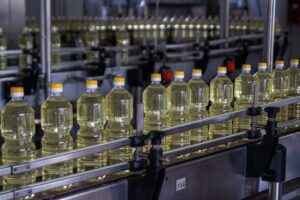
The Asian Development Bank has approved two loans to Uzbekistan totaling $400 million to implement large-scale reforms in the energy sector aimed at improving its efficiency and competitiveness, as well as developing the country’s financial markets.
ADB’s Director General for Central and West Asia, Evgeny Zhukov, said that the reforms supported by these programs will help create an enabling environment for regulators and companies to play their part in stimulating development by creating reliable domestic financial markets and meeting energy needs while fighting climate change.
ADB will provide $300 million to reform Uzbekistan’s energy sector, including creating a more effective governance structure, improving legislation, and attracting private investment.
To develop Uzbekistan’s financial market, ADB will provide $100 million to implement regulatory and institutional reforms aimed at improving market conditions to optimize financial transactions and services, and to increase supply and demand side measures to grow capital markets.
Uzbekistan joined ADB in 1995, and since then, the bank has provided $12.5 billion in loans, grants, and technical assistance to the country.

Rapeseed oil exports in July-June 2023-2024 marketing year (MY) reached a record high of more than 420,000 tons, Ukroliaprom association said.
“Ukrainian rapeseed oil is confidently entering the markets of China, EU, Malaysia, Singapore and other countries of the world. Positive dynamics is also observed for rapeseed meal,” the industry association said.
According to Ukroliaprom, for the first time in all years in Ukraine processed 1.0 million tons of rapeseed, which amounted to 22.3% of the harvest in 2023, and this despite the fact that rapeseed is considered mainly export-oriented raw materials.
In addition, exports of soybean oil and meal, and their production and processing accordingly, continue to grow, especially in January-June 2024.
“The growth of domestic processing of seeds and soybeans, as well as a significant increase in exports of high value-added products, namely oil and meal, confirms the association’s position on the need to create conditions for maximum processing of oilseeds at domestic facilities. Further development of the oil and fat industry of Ukraine is expected not so much in increasing the processing of sunflower seeds, but in such oilseeds as soybean and rapeseed, which are still considered as export-oriented. In this matter we hope for the support of the Ministry of Agrarian Policy and Ministry of Economy of Ukraine”, – emphasized the industry association.
Ukroliaprom stated that sunflower oil exports in January-June 2024 doubled compared to the same period in 2022 and 1.3 times in 2023. In the ten months of 2023-2024 MY, sunflower oil exports increased 1.2 times compared to the same period of 2022-2023 MY.

In January-July this year, Ukrainian enterprises increased their consumption of rolled metal products by 1.67% year-on-year to 2 million 34.6 thousand tons.
According to a press release issued by Ukrmetallurgprom on Monday, 711.6 thousand tons, or 34.97% of the domestic rolled metal consumption market, were imported during this period.
According to Ukrmetallurgprom, in January-July 2024, steel companies produced 3.728 million tons of rolled metal products (128.4% compared to the same period in 2023), of which, according to the State Customs Service of Ukraine, about 2.405 million tons, or 64.5%, were exported. In January-July 2023, the share of exports amounted to 51.3% (1.490 million tons against a total production of 2.903 million tons of rolled steel).
The share of semi-finished products in export deliveries in January-July 2024 amounted to 46.90%, which is the same as in January-July 2023 (46.11%). The share of flat products in export deliveries in seven months of 2014 is significantly higher than in January-July 2023 (39.83% and 34.77%, respectively). The share of long products is significantly lower than in January-July 2023 (13.26% in 2024 vs. 19.13% in 2023).
“In 7 months of 2024, the domestic market capacity amounted to 2034.6 thousand tons of rolled steel, of which 711.6 thousand tons or 34.97% were imported. In January-July 2023, the domestic market capacity was 2001.2 thousand tons, of which 588.2 thousand tons or 29.39% were imported. Thus, for 7 months of 2024, there is an increase in the domestic market capacity by 1.67% compared to 7 months of 2023, with a simultaneous increase in the share of the import component by 5.58%,” the press release states.
The structure of imports in January-July 2024 is still characterized by a significant dominance of flat products over long products (79.38% and 19.04%, respectively); in January-July 2023, the dominance of flat products over long products was also significant (78.83% and 20.13%, respectively).
According to the State Customs Service, the main export markets for Ukrainian rolled steel products in January-July 2024 were the European Union (74.3%), Africa (8.8%) and the rest of Europe (7.6%). Among metallurgical importers in the first seven months of 2024, the first place was taken by other European countries (47.1%), the second by the EU-27 (29.8%), and the third by Asian countries (21.2%).
As reported, Ukraine’s rolled metal market grew 2.19 times in 2023 compared to 2022, to 3 million 505.6 thousand tons.
The company imported 1 million 118.6 thousand tons, or 31.91% of the domestic rolled metal consumption market.

Kairat Satybaldy (Satybaldyuly), nephew of former Kazakh President Nursultan Nazarbayev, has returned illegally acquired assets worth $1.6 billion to the state since 2022, the press service of the Anti-Corruption Agency reported.
“Since 2022 until now, property assets and cash worth over 732.8 billion tenge or $1.6 billion illegally acquired by K. Satybaldyuly and persons related to him have been returned to the state,” the report said.
Of these, $661.5 million were found abroad and were returned to Kazakhstan as soon as possible, including from such countries as Austria, Liechtenstein, UAE and Turkey.
According to the press service, 28.8% of shares of Kazakhtelecom JSC for 93.8 billion KZT (almost $196 million); CTS JSC (Transport Service Center) for 30.2 billion KZT ($63.1 million); shares in 4 companies for 10.3 billion KZT ($21.5 million); property assets in Kazakhstan for 158.5 billion KZT ($331.1 million) were returned to the state; exclusive jewelry worth 105.39 bln KZT ($230 mln); money on Kazakhstani accounts – 36.8 bln KZT ($76.9 mln); money from Austria – 36.8 bln KZT ($82.1 mln); money from Liechtenstein – 116.7 billion tenge ($260.5 million); money from UAE – 6.3 billion tenge ($14 million); money from Turkey – 2.2 billion tenge ($4.92 million); sale of securities – 135.8 billion tenge ($300 million).
In the state property transferred 115 Kazakh objects worth more than 158 billion tenge ($330 million), including 73 real estate (13 houses, 10 buildings, 13 land plots, 4 apartments, 3 structures, 2 madrasah buildings with an annex, 2 parking lots, 25 premises, 1 construction in progress), 37 items of movable property (29 cars, 5 special equipment, 3 quad bikes) and other property.
It is noted that some of the property was registered to his close relatives, affiliated persons and controlled companies. The total area of administrative buildings transferred to the state in the cities of Astana and Almaty exceeds 180 thousand square meters. m.
“Previously, these assets were leased and annually brought the owner a multi-billion dollar income, the recipient of which is now the state”, – said in Anticor.
For example, one of the luxury objects – the former residence of Satybaldyuly in the village of Barap, Akmola region, with a total area of 1.5 thousand square meters with a land plot of 135 hectares – was transferred to the Department of Education of Astana.
The agency added that during the investigation Satybaldyuly fully admitted his guilt, reimbursed the damage in full, as well as contributed to the investigation of criminal offenses and disclosure of property obtained by criminal means.
The Anticorruption Service investigated criminal cases against Satybaldyuly on the facts of embezzlement of funds of Kazakhtelecom JSC, Transport Service Center JSC on a large scale, legalization (laundering) of money and other property obtained by criminal means, as well as evasion of customs duties by the company controlled by him.
The official rate for August 12 – 477.04 tenge/$1.

The network of laboratories “Eskulab” plans to resume work in Kyiv and Kyiv region in the coming days after the attempted raider seizure, and to expand the network in the region to more than 100 collection points by the end of the year.
“We currently have 32 collection points in Kyiv and the region, and we plan to open another 70 by the end of the year. We will definitely return to work next week, we will stabilize the situation and start collecting biomaterial from our patients in the near future,” said Svitlana Zinchenko, the network’s chief operating officer, at a press conference at Interfax-Ukraine on Monday.
For his part, Andriy Zborivsky, head of Eskulab’s legal department, said that during the attempts to illegally take over the company by its co-founders Stanislav Lugovskyi and Denys Melnyk, “massive and systematic violations of cash discipline and tax evasion are taking place at the biomaterial collection points.”
“We appealed to the tax authorities, and they conducted inspections based on our requests, and three violations of cash discipline were identified in two days of such inspections. The facts of the violations are being recorded and forwarded to law enforcement agencies. The perpetrators will be held accountable, including criminal liability,” he said.
He also said that the activities of Eskulab are being blocked by MZ Group, which provided IT services to Eskulab.
“MZ Group has blocked the accounts of all employees of Eskulab-Center. As a result of such actions, it became impossible to perform laboratory tests of biomaterial that was taken from thousands of patients,” he said.
Zborivsky noted that “there are facts of blocking biomaterial in the Lviv and Kyiv laboratories of the network,” and the heads of the Kyiv and Lviv laboratories concealed patients’ biomaterial.
“These illegal actions threatened the health and lives of patients, as many patients demanded immediate results. Including while in hospitals. These facts were reported to law enforcement agencies and criminal investigations were opened,” he said.
“The management of the Eskulab laboratory in the Kyiv region is taking all necessary actions to eliminate the negative consequences of such illegal actions, to resume the company’s activities and to perform laboratory tests,” he said.
Zborivsky emphasized that “the laboratory is taking all possible actions to bring the perpetrators to justice.”
In turn, Yuliana Dutko, Head of Business Intelligence at Eskulab, said that from July 19 to July 25, the laboratory’s information system was interfered with and blocked, “first of all, the accounts of Director Serhiy Dyadyushko, COO Svitlana Zinchenko, collection point employees and office staff were blocked.”
In addition, according to Dutko, “the partners reached the peak of their immorality and manually deleted registered orders.”
“We have confirmation that all these actions were carried out by employees of Igor Malinowski’s MZ Group,” she said.
Dutko also said that the employees of the collection points were instructed by Stanislav Lugovskyi not to pay for the tests through the system, thus avoiding taxation. At the same time, a backup data storage was used to carry out this manipulation.
“In particular, we recorded in one of the points that the total payment for the tests amounted to more than UAH 10 thousand, while taxes were paid from UAH 210,” she said.
For his part, Serhiy Dyadyushko, director of Eskulab Center, noted that the raiders’ actions “caused the laboratory huge reputational damage, which is difficult to assess.”
“This is not just a corporate conflict. It is about the fact that patients were involved in this conflict, and this endangers their lives and health. Patients are postponing surgeries and visits to doctors because of the artificially created situation, while Luhovskyi and Melnyk are withdrawing millions of hryvnias from Eskulab in Lviv,” Dyadyushko emphasized.
As reported, at the end of July, the network of laboratories “Aesculab” suspended its activities in Kyiv due to a conflict that arose between the owner of the network, Serhiy Dyadyushko, and its co-founders, Stanislav Luhovskyi and Denys Melnyk. Ihor Malynovskyi, Luhovskyi’s cousin, acted as the administrator of the lab’s software.
The conflict between the co-founders of the Eskulab network arose in 2023, when Luhovskyi and Melnyk tried to re-register Diadiushko’s share and exclude him from the network.
Eskulab Medical Laboratory is one of the three largest private laboratories in Ukraine, contracted by the National Health Service of Ukraine (NHSU). The network consists of five laboratory centers and 180 sample collection points in the western regions of Ukraine and Kyiv.
In 2023, Eskulab paid UAH 33.8 million in taxes, including UAH 14.97 million in unified social tax, UAH 1.33 million in military duty, and UAH 14.034 million in personal income tax. It is one of the ten largest taxpayers in Lviv region.
The co-founders of PE “PSML “Eskulab” are Dyadyushko, who owns 43% of the company, Luhovskyi (43%) and Melnyk (14%). The co-founders of Eskulab Center LLC are Dyadyushko, Luhovskyi and Melnyk, who each own 20% of the company, and Ruslana Soltani, who owns 40%.
Diadiushko, Hnatysh, Petrovsky, Zborivsky, Дутко, Ескулаб, Зинченко

“Metinvest, Ukraine’s largest mining and metals holding, increased its total production of iron ore concentrate (IOC) by 87% year-on-year to 8.892 million tonnes in January-June this year, and pellets by 25% to 3.193 million tonnes, but reduced its total output of coking coal concentrate by 31% to 2.085 million tonnes.
According to the operating report of the parent company Metinvest B.V. on Monday, the production of commercial iron ore products more than doubled to 8.021 million tons, and the production of commercial iron ore concentrate increased 3.4 times to 5.023 million tons, which was facilitated by the unblocking of Ukrainian Black Sea ports from August 2023 and an increase in the order book for coking coal pellets.
It is noted that due to limited electricity production in Ukraine due to Russian shelling since mid-March 2024 and high demand for imported electricity, its cost affects the workload and configuration of the group’s mining and processing plants.
At the same time, Metinvest distributes the workload of its mining and processing plants based on the availability of electricity, its cost, market prices for iron ore products and other factors to ensure efficient production.
As a result, in Q2 2024, total iron ore production decreased by 17% quarter-on-quarter to 4.033 million tonnes, while the output of commercial iron ore products decreased by 13% to 3.814 million tonnes, including the production of commercial iron ore pellets, which decreased by 22% to 2.205 million tonnes. At the same time, the production of commercial pellets remained almost at the level of the previous quarter at 1.609 million tons.
According to the report, the group’s coal concentrate production in 2Q2024 decreased by 8% quarter-on-quarter to 999 thousand tons.
It is noted that the main factor behind this was a 12% decline in production at Pokrovske Coal Group (Ukraine) to 562 thousand tons, among other things due to the planned redistribution of mining operations in view of the capacity of production sites.
United Coal Company’s (USA) production of coal concentrate remained almost at the level of the previous quarter – 437 thousand tons. It is noted that in 1H2024, the group’s coal concentrate production decreased by 31% mainly due to a 39% decrease in production at United Coal Company due to the suspension of production at Carter Roag mines and a decrease in production at some Wellmore mines. In addition, Pokrovske Coal Group’s coal concentrate production decreased by 25% mainly due to optimization of mining operations due to changes in mining and geological conditions.
“Metinvest comprises steel and mining companies located in Ukraine, Europe and the United States. Its major shareholders are SCM Group (71.24%) and Smart Holding (23.76%), which jointly manage it.
Metinvest Holding LLC is the management company of Metinvest Group.